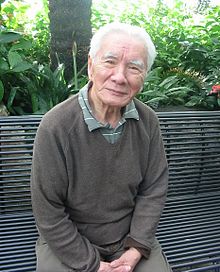Jerome Ch'en
| Jerome Ch'en | |||
|---|---|---|---|
 Jerome Chen in 2003 | |||
| Traditional Chinese | 陳志讓 | ||
| Simplified Chinese | 陈志让 | ||
| |||
Jerome Ch'en FRSC (Chinese: 陳志讓; pinyin: Chén Zhìràng; October 2, 1919 – June 17, 2019) was a Chinese-Canadian historian who served as Chinese history professor at York University in Toronto, Canada from 1971 to 1987. He was the director of the University of Toronto/York University Joint Centre of Asia Pacific Studies (JCAPS) from 1983 to 1985. He was made a Fellow of the Royal Society of Canada in 1981. In 1984, he was named Distinguished Research Professor at York.[1]
Ch'en was born as Ch'en Chih-jang in Chengdu, Sichuan, Republic of China in October 1919. He was educated at Tianjin Nankai University, National Southwestern Associated University in Kunming during the Anti-Japanese War, and at the London School of Economics, which he attended funded by a Boxer Indemnity Scholarship. He studied under Friedrich Hayek at LSE. In the 1950s, he worked for the Chinese Service of the BBC. Before emigrating to Canada he taught history at the University of Leeds for a number of years. Ch'en died in St. Catharines, Ontario, Canada in June 2019 at the age of 99.[2]
Principal works include:
- Yuan Shih-ka̕i, 1859-1916: Brutus Assumes the Purple (George Allen & Unwin, 1961).
- The Highlanders of Central China: a History 1895 – 1937
- Mao and the Chinese Revolution
- The Military-Gentry coalition—the Warlords Period in Modern Chinese History
- China and the West: Society and Culture 1815 – 1937
He also edited:
- Great Lives Observed: Mao
Some of his works have been translated into Chinese or Japanese.
References[]
- ^ Lary, 2019.
- ^ Jerome Ch'en Obituary
Further reading[]
- Lary, Diana. "Jerome Ch’en obituary: Historian of modern China, cut off from his roots, who rued the rise of the military and the Communist conquest" The Guardian 18 July 2019. online
External links[]
- Jerome Ch'en archives at the Clara Thomas Archives and Special Collections, York University Libraries, Toronto, Ontario
- Jerome Ch'en Resource Centre for East Asian Studies
- 1919 births
- 2019 deaths
- 20th-century Canadian historians
- 21st-century Canadian historians
- Academics of the University of Leeds
- Alumni of the London School of Economics
- Boxer Indemnity Scholarship recipients
- Canadian male non-fiction writers
- Canadian sinologists
- Chinese emigrants to Canada
- Chinese expatriates in the United Kingdom
- Chinese sinologists
- BBC people
- Educators from Sichuan
- Fellows of the Royal Society of Canada
- Historians from Sichuan
- Modern Chinese historians
- Nankai University alumni
- National Southwestern Associated University alumni
- Writers from Chengdu
- Writers from Toronto
- York University faculty